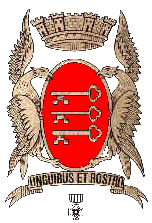 photo : Tax refugees waiting for an audience at the front of the legates'palace, March 2013
photo : Tax refugees waiting for an audience at the front of the legates'palace, March 2013At the end of the XVIII century, Avignon, which included the city of Avignon and a few surrounding communes, had a population of about 25.000 and had been a papal enclave since 1348. It was governed by the pope's representative, the vice-legate, and a municipal council - controlled by the clergy, and a few prominent families. Abuses in the papal administration were widespread, and the relatively small enclave was at the mercy of French excise and customs regulations. Well before the French Revolution the industrial and commercial bourgeoisie, particularly the silk manufacturers, and members of the legal community were demanding reform in the judicial and taxation systems and a broadening of their representation in the council. There was discontent as well among artisans and peasants, aggravated after 1788 by an economic crisis that led to a sharp rise in bread prices and unemployment in the silk industry, the mainstay of the county's economy besides attending to the needs of the thousands priests, nuns and monks who still lived in the city.
According to an interesting "Compte rendu à l'Assemblée Nationale comme commissaire du Roi à Avignon, le 19 novembre 1791", ( you can buy this rare book here), encouraged by the first results of the Revolution in France, Avignonese Revolutionaries renewed their demands of "rattachement à la France" and supported them with demonstrations. By March 1790, the revolutionaries had gained control of the municipal council. They adopted the main provisions of the constitution then being framed in France, wich the pope refused to accept. After his supporters in Avignon made an unsuccesful bid to reassert his authority by force, the Revolutionaries declared Avignon independent of the papacy and voted to join France (11 June 1790). The villages in the Comtat Venaissin, Papal possession aroud Carpentras, followed suit.
Avignon was thus one of the first places in the world were the principle of self determination, or as was enounced at the times the " Right of the peoples to dispose of themselves" was put in practice. What if the Avignonese people decided to backtrack, and become free again under the distant authority of the Pope ?
One can wonder, in those days of over taxation and subsequent tax evasion by France's rich and sometimes famous, if Avignon wouldn't be better of as an independent state, advertising itself as a tax haven within the EC frame ?
Somebody thought about it - below is the translation from an imaginary prospectus the new free Avignon state would issue soon after independence :
Venite & Defiscalite in Avenio
Come & pay less taxes in Avignon
NEO-PONTIFICAL STATE of
AVIGNON AND COMTAT VENAISSIN
 Generous Offer for MM. Tax Refugees :
Generous Offer for MM. Tax Refugees :
It pleases the sovereign Avignon Curia, so predisposed by the Divine clemency, and considering the Blessed freedom of Avignon and the Comtat off the French yoke, but also the subsequent impecunious state of our coffers, to hereby proclaim:
The following rights and priviledges shall be awarded ex sollicitudo to MM. Tax Refugees of good morals, of any faith and condition but substantial fortune:
Primo - Right of Entry and Passport
Free Admission and Liberty of movement granted to the refugee and his family throughout the City, the Comtat Venaissin and abroad, as soon as they hold the prestigious and unexpensive Passport issued to all tax refugees and bearing the three keys of Paradise, as on the coat of arms of the sovereign Curia.
Secundo (et inter gravissimas) : Modest Tax
Stable and charitable tax package never ever exceeding one tenth or decimate of the revenues of the incumbents.
Tertio - Residency rights
Unlimited right of residence in a blessed climate , with much sun & few rain (the wind comes from elsewhere we can do nothing about it)
Quarto - Ownership rights
Freedom to buy, own, either freehold or perpetually in the city, intra & Extramuros, in the Comtat, in & the Vaucluse mountains all the way to the Wall of the Plague, which isolates us from the dangers of France ;
Quinto- Discretion in money matters
Secrecy of Bank & Exchange Transaction shall be defended "Inguibus and rostro" the motto of our state; and guarranteed under the solemn privilege of our apostolic Notaries.
Sexto- Education
Liberal access to our famous Schools, Colleges and Ancient University and their adjacent Taverns;
Septio - Writing
Freedom of opinion and of the press guaranteed by our ancient laws concerning Printing & Publishing, allowing the refugees to indulge in all kind of nonsense, provided, however, not to say anything blasphemous or insulting to his Sanctimoniousness the Neo-Legate, his Camerier, the noble Curia, etc..
Octavo - Grace
For Godly Souls, plenty of opportunities to thank the Divine Providence shall be found in our two hundred churches and chapels, convents and brotherhoods ; not excluding our three ancient Synagogues of Avignon, Carpentras, Cavaillon, and ithrowed in quite a few recent Mosques.
For His Eminence the Neo-Legate
the Grand Camerier of the sovereign Curia in Avignon.
Tax refugees : Place your petitions to the Grand Camerier accompanied immediatly by a deposit frankly it is better.